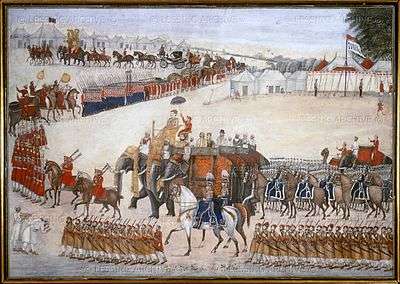Yusef Ali Khan

Nawab Muhammad Yusef Ali Khan Bahadur, KSI, (5 March 1816 – 21 April 1865) was a Nawab of the princely state of Rampur from 1855 to 1865. During the First War of Independence, he rendered many useful services to the Government of India by keeping the British supply and communication lines to Naini Tal open, rescuing fugitives and securing the town of Moradabad. For his service, he was granted extensive lands in Bareilly by the Viceroy of India, Lord Canning, was knighted in 1861 and given a 13-gun salute along with the style of His Highness. Finally, he was made a member of the Viceroy's Council. Despite this multitude of honours, Sir Yusef continued to preserve the Mughal artistic tradition by inviting musicians, scholars and artists of Bahadur Shah Zafar II's court to resettle at Rampur, including the great poet Ghalib. Dying at 49 in 1865, he was succeeded by his son, Sir Kalb Ali Khan Bahadur.[1]
Shortly before he died, the Yusef Ali Khan promoted the formation of the Bank of Rohilkund (or Bank of Rohilkhand), over the objection of local moneylenders.[2] It was established in 1862, just after the acceptance of limited liability for banks. The bank was the first promoted by a princely state. It too was a small bank and was amalgamated into the Oudh Commercial Bank, which failed in 1958.[3]
Titles
- 1816-1855: Nawabzada Muhammad Yusef Ali Khan, Wali Ahad Bahadur
- 1855-1860: 'Ali Jah, Mukhlis ud-Daula, Nasir ul-Mulk, Amir ul-Umara, Nawab Muhammad Yusuf 'Ali Khan Bahadur, Mustaid Jang, Nawab of Rampur
- 1860-1861: 'Ali Jah, Farzand-i-Dilpazir, Mukhlis ud-Daula, Nasir ul-Mulk, Amir ul-Umara, Nawab Muhammad Yusuf 'Ali Khan Bahadur, Mustaid Jang, Nawab of Rampur
- 1861-1865: His Highness 'Ali Jah, Farzand-i-Dilpazir, Mukhlis ud-Daula, Nasir ul-Mulk, Amir ul-Umara, Nawab Sir Muhammad Yusuf 'Ali Khan Bahadur, Mustaid Jang, Nawab of Rampur, KSI
Honours
References
- Detailed biography
- Tripathi, Dwijendra (2004) The Oxford History of Indian Business. (New York). ISBN 9780195659689
- ↑ http://www.4dw.net/royalark/India/rampur4.htm
- ↑ Indian Journal of History of Science, 1982, Volumes 17-18, p.112.
- ↑ Tripathi (2004), p.136.
| Yusef Ali Khan Born: 5 March 1816 Died: 21 April 1865 | ||
| Regnal titles | ||
|---|---|---|
| Preceded by Muhammad Said Khan Bahadur |
Nawab of Rampur 1855-1865 |
Succeeded by Kalb Ali Khan Bahadur |